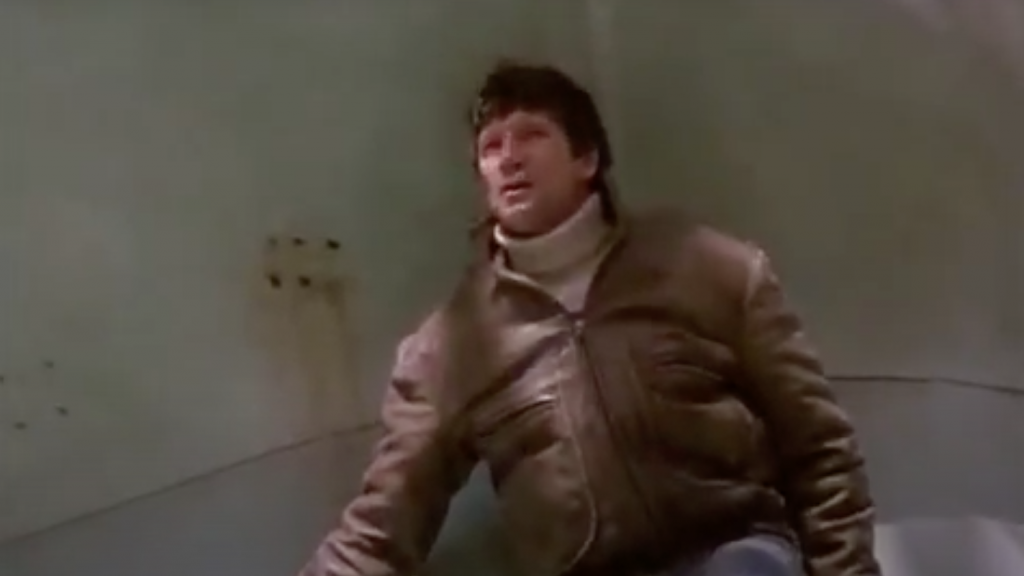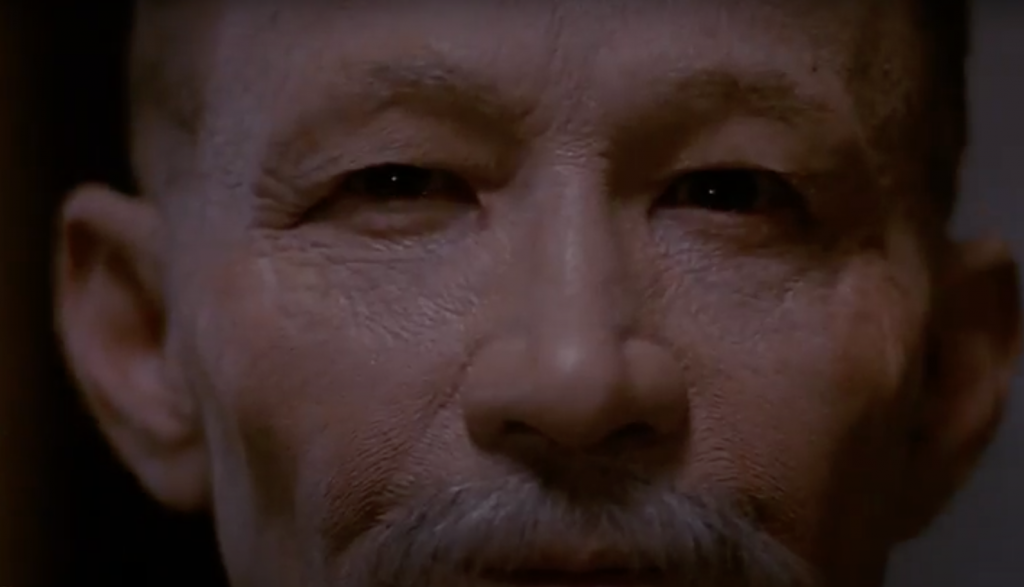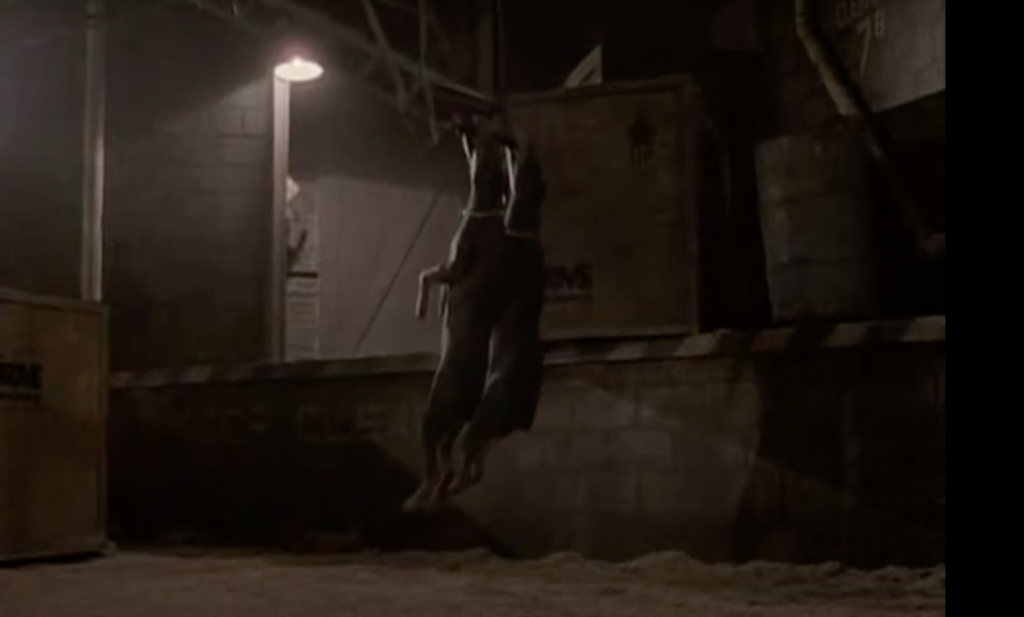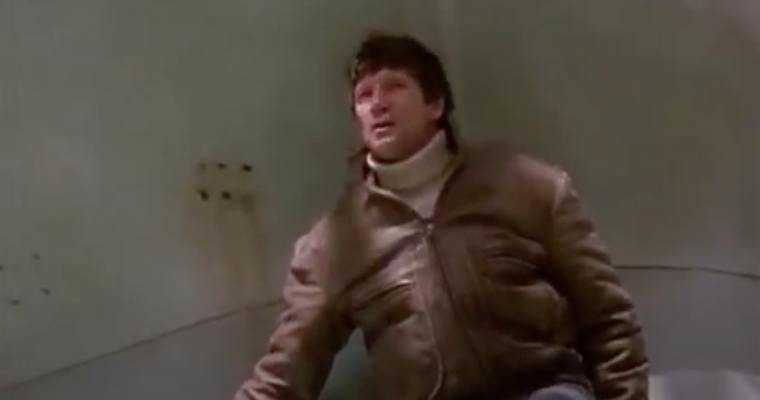
The one piece of movie trivia that Remo Williams: The Adventure Begins is probably most remembered for now is that it didn’t actually begin anything. The 1986 movie, intended to spin into a series based off of Warren Murphy and Richard Sapir’s series of men’s adventure Destroyer series of pulp novels underperformed significantly enough at the box office that the series never developed, apart from a TV pilot that aired in 1988 and also failed to go to series. I have become the destroyer of franchises.
The premise of the movie is fairly easily summarized, although summary just makes it seem more absurd. A Newark cop (Fred Ward) is recruited by a beyond top-secret government organization to be their field agent. Recruitment here means faking his murder, giving him plastic surgery, and a new name, but I’ve seen worse on LinkedIn. Ward, it should probably be pointed out, is not a natural when it comes to action. He is beefy, awkward, and moves more like a dad playing touch football than someone who is trained to be an expert in the entirely fictional Korean martial art of Shinanju. But that’s not actually the worst bit of casting in the movie. That would be the role of the Korean martial arts master Chiun. Portrayed by Joel Grey, who is noticeably not Korean. Or any kind of asian. Or anything other than the son of a Borsht-Belt comic.

Yes, we probably need to get this out of the way. That is Joel Grey in yellowface. And not just any yellow face, but Oscar-nominated yellowface. And it probably would have been Oscar-winning yellowface had it not been going up against (what else?) Mask. To say that 1985 was a different time isn’t enough. This casting decision was not only barely questioned at the time, the performance and the makeup were ebulliently praised. It was not the right decision to make. And the only silver lining in that cloud over Joel Grey’s career that I can find is the fact that the paranoid, right-wing fans who seem to be the only fans that this movie has left are enthralled by a character played by a gay, Jewish man. That’s at least a mild chuckle of irony. But it’s not the yellowface I want to talk about here. It’s those paranoid, right-wing fans.
The organization at the heart of the film is CURE, an extra-legal assassination squad set up by President Kennedy. CURE, it should be noted, is not actually an acronym, although it is always capitalized in the books. It’s sort of the anti-e.e. cummings of assassination squads. Cure is controlled by a typically gruff Wilfred Brimley from an office in the New York Federal Bank, where he monitors all electronic communication in America from a Tandy 1000. CURE reports only to the president, seeking out and eliminating corruption and threats to the United States through exclusively lethal means. The target in this instance is Patrick Kilpatrick’s Stone, head of Stone Industries, a man who is so villainous he doesn’t even get a first name. And whose death is necessary because of a series of cost overruns on a defense contract.
Seriously.
Propaganda can be blatant, it can be insidious, and in instances like Remo Williams it can be both. Defense department cost overruns were not a pressing concern during the Regan era. The twist here is supposed to be that the particular project that Stone Industries is working on, a Star Wars type missile-defense system, is an illusion, and elaborate hoax that existed only to trick the U.S. Government into wasting money and would never actually work. Cost overruns and outright fraud on defense contracts were not the type of crimes that were ever prosecuted during the Regan administration, and certainly not now. Why then does the movie exist to make us think that the executive branch will go beyond its Constitutional powers to put a stop to them? Well, because that’s what has to be done to make the system work.
The system doesn’t work is the reason gruff Wilfred Brimley gives for the necessity of CURE. Bad, corrupt people have worked their way in and are conspiring to destroy the American Way of Life. Only by going outside the realm of legality and acting with extreme violence can this situation be corrected. The system should work. And it should work for the right kind of people.
It’s the fundamental right-wing conspiracy. Remo Williams is just a slightly more buff version of the Pizzagate shooter.
The reality of 1985 was that the actual Star Wars missile-defense system was already an elaborate hoax. Defense contracts would happily take the billions of appropriations thrown at them to research and develop the system without ever having to acknowledge that there wasn’t much to research beyond “this will never work” and much to develop beyond animations of issues being shot down that could be shown at press conferences. The whole thing was a boondoggle, from beginning to end, if it has ever truly ended. But this isn’t the system not working, it was the system working precisely the way it was meant to work. It isn’t individuals who are perverting the system to produce corruption, it’s a perverse system that produces corrupt individuals. And as long as it’s making enough money for the right sort of people it’s doing what it’s supposed to do. But for it to really work properly, you need enough people to not see that. And that’s where the lovely mix of patriotism and violence comes in.
The fantasy of Remo Williams is that violence is the only true form of patriotism, and the only effective way of social change. That the system isn’t broken, it’s just that the real villains are a shadowy cabal behind the curtain. That white people are the only ones who are entitled to use violence, and when used in righteous white hands violence has a mystical status.
I’m writing this in the same week as a group of armed militia men stormed into the Michigan State Capitol Building. That’s about an hour away from my home. At a time when the inability to think in terms of systems instead of individuals is having lethal consequences. At a time when propaganda disguised as entertainment is on a 24/7 feed across the nation. At a time when people a national political party is basically becoming a death cult to uphold the illusion that patriotism and violence will fix everything.
All of this is not the fault of a mediocre 25-year old action movie. But the lack of media awareness and the failure to teach how to think critically about media plays a large part in it.
I watched this movie when I was a kid, uncritically. I also read many of the Destroyer books when I was a kid. My break with the series came with book #30, the fantastically racist Mugger Blood. I don’t want to give myself too much credit here, this also happened at the same time that I first read Steinbeck and realized that literature could be better than what Sapir and Murphy were chugging out. But I do have a distinct memory of sitting in an overly-hot trailer that substituted for a classroom at my middle school (North Carolina school funding was not great in the eighties) and being made viscerally uncomfortable by a scene in which Chiun tortures a group of young black men into using his preferred pronunciations of English. It was one of those moments, along with realizing that every time Piers Anthony introduced a female character she was naked within three pages, that made me aware of the fact that authors exist. And that sometimes they’re just assholes. That Remo Williams played such an oddly crucial role in my intellectual development may be what made me click on the movie last night as it came up in the endless game of streaming roulette we’ve been playing the last month.

Revisiting the movie now, I’ll admit that it’s always a joy to see Kate Mulgrew in anything, and that those dobermans are actually pretty amazing. But overall I feel like the legacy of this movie, and movies like Rambo and Red Dawn is not a positive one. And I’m still unsettled by knowing that there was a route I could have taken in life where I didn’t recognize that the movie’s endorsement of extrajudicial murder as the only valid solution to social problems is bad. And that the fact that I could stream this movie easily, readily, and for free but can’t do the same with another movie from 1985 which does look at some of these concerns critical, Ross Mcelwee’s Sherman’s March, means we still have a problem.
I’m not saying that we need to be fed all art films all the time. I’ve definitely been preferring old Hammer horror flicks over The Criterion Chanel this past month. But we need to recognize that media is not neutral. Media does shape perception. And we need to find ways as a society to make the tools of critical media evaluation available to everyone, so that the seeds of paranoia that can be planted by a movie like Remo Williams don’t grow into full Q Anon obsession. We need to find ways to seize the means of cultural production as an antidote to this kind of propaganda.
And we should also probably stop casting beefily awkward middle-aged white guys as action heroes while doing it.
